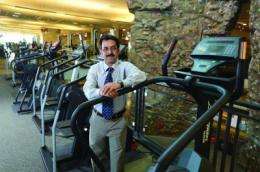Aging kidneys may hold key to new high blood pressure therapies

Gaining new insight to managing sodium balance and blood pressure, investigators at the University of Houston (UH) College of Pharmacy believe their work may identify future therapeutic targets to control hypertension.
Mohammad Asghar, assistant professor of pharmacology, is exploring the mechanisms by which oxidative and inflammatory stressors – considered hallmarks of the aging process – alter the function of two critical receptor systems in the kidneys that are involved in sodium metabolism and blood pressure. While there are different hormonal systems in the body that aid in sodium balance, at the center of Asghar's research are the dopamine and angiotensin II receptor systems that play pivotal roles in fine-tuning sodium stability and maintaining normal blood pressure.
"When the function of these two receptor systems is defective, the equilibrium of sodium is disturbed, causing an increase in blood pressure," Asghar said. "Yet, it remains unclear as to what triggers the dysfunction of the receptors and their delicate balancing act."
In research conducted up to this point, supported by funding from the National Institutes of Health (NIH), Asghar and his collaborators have identified two likely factors – inflammation and oxidative stress – that have adverse effects on kidney functions. His results showed that exercise training builds up strong anti-inflammatory and antioxidant environments, thereby improving kidney functions during aging.
"We now are attempting to determine the mechanisms by which oxidative stress and inflammatory stress exert their actions upon these receptors and contribute to increased blood pressure," Asghar said. "We are currently investigating if exercise training has beneficial effects in improving dopamine and angiotensin II receptor functions, sodium balance and control of blood pressure during aging."
With this next phase of research funded by a five-year, $1.5 million grant from the NIH's National Institute on Aging, Asghar has set out to specifically examine resistant hypertension, which is a particular type of high blood pressure that does not respond to treatment.
"Resistant hypertension, which is typical of the aging phenomenon, requires a combination of drugs for blood pressure control," he said. "Currently available medications are not effective to treat resistant hypertensive patients. While my research is focused on aging, the outcomes may very well benefit both adult and older populations who suffer from hypertension."
Citing studies that have linked both a low-sodium diet and exercise to reducing oxidative and inflammatory stress, Asghar is a proponent of moderate, regular exercise and better dietary habits. In addition to further investigating the relationship between high salt and hypertension through his analyses of receptor systems in the kidneys, he also is looking at how exercise and antioxidant or anti-inflammatory therapeutic agents may restore the function of those two key receptors to reduce hypertension. He believes this exercise research could yield potential therapeutic targets that mimic exercise, which may prove beneficial for those individuals who are unable to exercise due to physical or other disabilities.
Asghar and his team's ongoing work could lead to new treatments for millions of hypertensive individuals at risk for stroke, heart failure and a range of other cardiovascular diseases due to high blood pressure, which is a major risk factor for these ailments.
















